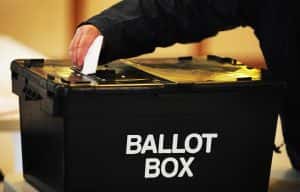On Thursday 12th December, the public will (hopefully) flood to the polling stations in order to exercise their democratic right to vote. However, only around half of those votes will equate directly to the seats filled in parliament. What happens to the other half of the votes? Well, they might as well have never been cast.

This is the state of our voting system in the UK today. First Past The Post has been our voting system since the 1800s, and has failed to evolve to reflect the changing landscape of politics. It gives voters only one vote to choose between all the candidates up for their seat, and whoever wins in their constituency – even if it’s just by one vote – is the MP for that area and all other votes are discounted. In the 2017 General Election, the constituency of Kensington was a Labour hold, with a majority of just 20 votes. This means that the 22,344 votes that were for parties other than Labour were completely discounted and ignored. In fact, in 2017’s election, 11 seats were won by fewer than 100 votes and 31 seats were won by majorities of less than 1%.
Sunderland Central remained a Labour safe seat in the 2017 election, but this still meant that over 20,000 votes were wasted in voting for the other candidates. As one of the strongest leave areas in the UK in three weeks’ time, it will be interesting to see how many Brexit and UKIP votes count for anything against Labour’s dominance in the area.
Sadly, it’s only when you look at the smaller political parties in the 2017 general election that you begin to realise how broken the system is. The Democratic Unionist Party, who went on to form a coalition with the Conservatives in order to give them a majority, received 292,316 votes, and won 10 seats. The Green Party received 525,685 votes and won just one seat. UKIP won even more votes and gained no seats at all. If we, the Great British people want to claim that we live in a democracy, based on their performance in 2017, they have far more right to have a voice in parliament than the DUP, Sinn Fein, Plaid Cymru or the Greens. Even looking at the slightly larger parties, SNP received over 1 million fewer votes than the Lib Dems, and yet they won 23 more seats than them. In what realm of the imagination does this reflect democracy?
It has an effect on voters, too. The electorate are all too aware of the brokenness of the system, and this is where the notion of ‘tactical voting’ sprung up. Rather than voting for the party or candidate with whose political view they agree with the most, voters will instead choose the candidate they predict is more likely to win in an effort to ensure their vote is not wasted. First Past the Post also created an army of apathetic and disinterested voters. Can you blame them? If the very system which is supposed to give you a voice and political rights relentlessly fails to reflect your views, why would you bother dragging yourself to your local church hall to scribble a cross in a box on a piece of paper? It would make more of an impact in the shredder than in the ballot box.
You only need to look at voter turnouts at general elections in the last few years to see the extent of the apathy. In 2017, the turnout was, admittedly, higher than expected, at 68.7%. In 2015, turnout was 66.2% and in 2010 it was even lower at 65.1%. However, the turnout for the EU Referendum just one year earlier in 2016 was 72.2%. The difference between these two votes? The EU Referendum used Proportional Representation.
Proportional Representation is a simple and far more democratic alternative to FPTP, and is used by almost 90 countries worldwide. To put it plainly: every vote counts. If you voted in the EU Referendum, no matter where you cast your vote, it counted towards the final result. The outcome? Voter turnout was higher than any general election turnout had been for decades and, disregarding how each campaign was run, the actual voting system itself was democratically carried out.
The same is possible for all voting in the UK. There are plenty of different groups, such as Make Votes Matter UK and the Electoral Reform Society, who are calling for proportional representation to be used in all of our public votes. There are plenty of different systems to choose from, whether it’s the Single Transferrable system or a Party List system. Which of these is the best system for the UK is a separate discussion altogether – the real challenge facing us today is even getting those in parliament to talk about it.
One of the main criticisms of PR is the belief that it will never result in a majority government and will cause more dreaded coalitions. Why are people so afraid of coalitions? Why do we shun them like some kind of taboo subject? Many countries such as Canada and Germany have coalition governments almost constantly and they haven’t fallen into an oblivion of shouting, filibustering and snide jeering yet have they?
In fact, after the second world war, the Allied forces chose PR as the political system for Germany, which is now the most stable economy in Europe. If it’s alright for Germany, why not for us? Indeed, the majority of our previous colonies, after having gained independence, chose to abandon our outdated system and now enjoy PR.
It is cross-party discussions that result in the fairest and most diplomatic outcomes and the fact that Brexit has been such a fiasco is due to the lack of cross-party cooperation.
So how do we push for this issue to be discussed in parliament and be implemented before the next general election? Well, how we vote in this general election is vitally important. During my visit to the Make Votes Matter meeting in Newcastle, one of the women there said that in 40 years of elections, only two of their votes ever translated into representation. Yet, she continues to exercise her right and campaign for a fairer system.
So, don’t vote tactically; don’t vote for who you think might win; don’t, please Lord, not vote at all. Vote for the party who best represents your political views and visions for the future, regardless of their size or popularity. Even if that means voting Green in a Labour stronghold. Even if that means voting UKIP in a Remain area. The more we defy the system, the more we can make the claim that it is broken and unfair and the more ammunition we have in our fight for change.



